|
|
|
Sort Order |
|
|
|
Items / Page
|
|
|
|
|
|
|
| Srl | Item |
| 1 |
ID:
145143
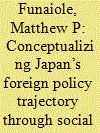

|
|
|
|
|
| Summary/Abstract |
Regional security studies of the Asia-Pacific commonly center upon China’s rise, leaving other actors underresearched. Among these is Japan, whose ongoing reinterpretation of its pacifist constitution may destabilize the region. This article employs Social Identity Theory, a social psychology theory of group behavior, to develop a unique framework that accounts for both the domestic and international constraints acting upon Japan’s foreign policy makers. By analyzing Japan’s foreign policy evolution through the lost decade of the 1990s into the changed landscape of the post-September 11th world, this article identifies a prevailing trend toward “normalization”. It is argued that Japan is on course to further distance itself from the pacifism embodied in Article 9 of its constitution.
|
|
|
|
|
|
|
|
|
|
|
|
|
|
|
|
| 2 |
ID:
162449
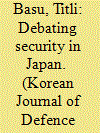

|
|
|
|
|
| Summary/Abstract |
Since the post–war era, understanding Japan’s security rhetoric and actions
presented certain incongruities. While the constructivist arguments underscore that
the influence of post–war antimilitarist norm shaped Japan’s security behavior, it
contradicts the realist underpinnings influencing Japan’s choices. To understand
Japanese post–war security orientation and comprehend the rapidly unfolding policy
shift, this paper explores three sets of questions: firstly, what are the competing
schools of thought in the Japanese security debate? What are their core arguments
on key issues including Article 9 of the Constitution, potency of the Self–Defense
Forces (SDFs), nature of the U.S.–Japan alliance and historical narratives of Japan’s
past? What are the inter-school and intra-school fault lines? Secondly, what are the
drivers that propelled the dominance of each school at different time frames? How
does the factional power struggle in the domestic political landscape enable each
school to maximize their space and influence in the current security discourse?
More specifically, why did mercantilists remained the dominant political force
throughout the Cold War? In contrast, what led to normalists gaining momentum
and substituting mercantilism as a potent force in the post–Cold War period?
Thirdly, how have political elites pursued their competing agendas and critically
analyze the case of Shinzo Abe? What are the influences that shaped his values?
What are the methods he employed to pursue his ambitions of making Japan a
“normal” nation? And how did he consolidate his political strength and manage to
realize concrete policy objectives?
|
|
|
|
|
|
|
|
|
|
|
|
|
|
|
|
| 3 |
ID:
143352


|
|
|
|
|
| Summary/Abstract |
East Asian theatre is fast evolving. China’s arrival as a major power in international politics is altering the existing regional balance of power and intensifying Japan’s quest for securing a rightful place in the international system. Japan is reacting to the asymmetrical power politics and Shinzo Abe is increasingly becoming restless in attempting to redefine Japan’s secondary power identity. This requires undoing the limitations that were forced on Japan in the post-war period, including the constitutional restrictions, especially the pacifist clause. Amid fiercely contested domestic debate, reinterpreting the pacifist constitution is certainly a bold step towards infusing clarity in Japan’s future security role. The key objective is to convey to Japan’s allies concerning the manner the SDF will cooperate with the US and other regional powers, such as Australia, India, Philippines, etc. How this ‘limited’ right to collective self-defence will translate into operation will remain to be seen. To understand the rapidly unfolding policy shift, it is imperative to understand the different waves of the debate on collective self-defence and deconstruct the recent cabinet decision; explore the arguments of the competing schools of thought in Japan; examine the nuances and drivers that propelled Japan to redefine its passive constitution; and understand how regional and extra-regional powers evaluate this policy reorientation. Few regional stakeholders raised an alarm over the approach adopted by Abe to achieve the policy objective underscoring his militarist ambitions. While the aggressive historical baggage has caused considerable unease, it is premature to be alarmed over Japan’s shifting security posture as possible re-militarisation is unlikely to represent the traits of Imperial Japan.
|
|
|
|
|
|
|
|
|
|
|
|
|
|
|
|
| 4 |
ID:
160482
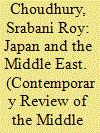

|
|
|
|
|
| Summary/Abstract |
As an introduction to this special issue, this article examines the shaping of Japan’s foreign policy; looking at how Japan has risen to the demand of the international community to assume more responsibility in conflict situations, circumventing a pacifist constitution that it had been dealt with. It then explains relations between Middle East and Japan and shows how the latter has been balancing its national interest in order to conform to its alliance with the United States. With more Asian powers having stake in the Middle East, Japan has become proactive about its role in the region. However, with limited hard power options, Japan would have to concentrate on its soft power capabilities and on using its economic strength to mark its presence in the Middle East.
|
|
|
|
|
|
|
|
|
|
|
|
|
|
|
|
| 5 |
ID:
092665
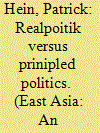

|
|
|
| 6 |
ID:
157818
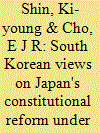

|
|
|
|
|
| Summary/Abstract |
In this Special Section, this article reviews South Korean views on Japan's ‘peace’ Constitution and the Abe government's attempts at constitutional reform. It identifies three different understandings among South Korean academics on why Japan is escalating attempts to revise the Constitution under the Abe government. An in-depth analysis demonstrates that all three perspectives pay specific attention to Japan's constitutional reform in relation to security policy changes. However, they differ in assessing the impact of Japan's constitutional reform on South Korea as well as how South Korea should deal with such a change. A minority opinion considers Japan's ‘remilitarisation’ through constitutional revision as conducive to South Korean security interests by increasing deterrence against North Korea, whereas the dominant opinion is that any attempt to revise the Constitution could be in and of itself a potential threat to South Korea's security due to a lack of trust attributed to unresolved historical conflicts between Korea and Japan. However, all three approaches pay hardly any attention to the positive role of Japan's peace Constitution while Japan's peace Constitution might provide a regional peace model in Northeast Asia.
|
|
|
|
|
|
|
|
|
|
|
|
|
|
|
|
|
|
|
|
|